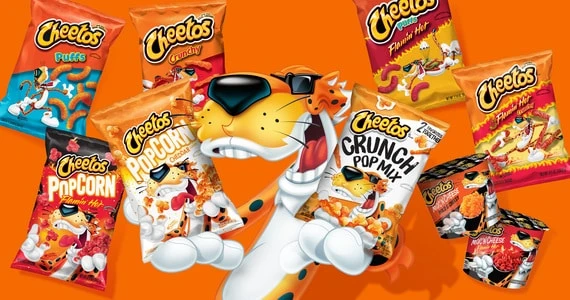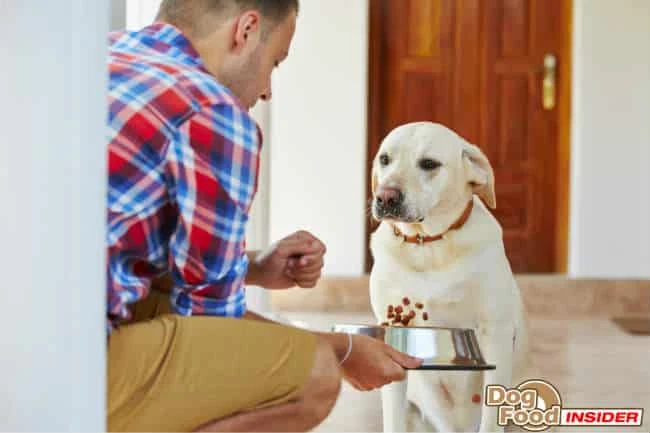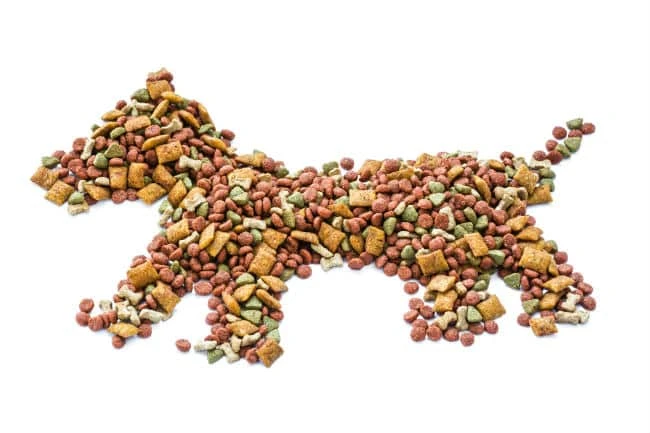Can Dogs Eat Cheetos? Are Cheetos Puffs Bad For Dogs?

It’s snack time. You grab your bag of Cheetos and relax on the sofa. Standing there with tail wagging, your furry friend is begging for a Cheeto Puff.
Should you give in and give him some cheesy goodness or are Cheetos bad for dogs? It can be hard to decide, you want to spoil your dog with treats but you don’t want to make them sick.
Ultimately, one Cheeto Puff is unlikely to cause any serious problems. However, there are several things to consider before you decide to give Cheetos to your dog.
Nutrition
First up, let’s consider the ingredients. Cheetos, while delicious, are not the best snack in terms of nutrition. According to the Cheetos website, 13 pieces of Cheeto Puffs contain:
- 10 grams of fat
- 16 grams of carbohydrates
- 270 mg of sodium
- 160 calories
These numbers make it nutritionally obvious that Cheetos Puffs are not an ideal snack. Like chips and other highly processed products, Cheetos contain too much fat, carbohydrates, calories, and sodium (salt).
Too much sodium in your dogs diet can negatively impact their health. Chips and other processed foods are typically high in salt and should not be included in your dog’s daily diet.
The fat, carbohydrates and calories in Cheetos are significant for the portion size. All dogs, regardless of size, should maintain a healthy weight.
Too many calories can lead to weight gain. Obesity in dogs can cause various adverse health effects, including cardiovascular disease.
Approximately 25-30% of the general canine population is obese, with 40-45% of dogs aged 5-11 years old weighing in higher than normal.
– Krista Williams, BSc, DVM; Robin Downing, DVM, CVPP, CCRP, DAAPM
Depending on the breed and activity level of your dog, the amount of weight that can cause complications varies. Small breed dogs and toy breed dogs can’t afford to gain much weight; whereas large breed dogs are unlikely to face any adverse health effects from only a few pounds.
Ultimately, it is your decision on whether or not your dog can snack on some delicious Cheetos. If you decide you are going to let Fido have your Cheetos, keep in mind your dog’s size.
Smaller dogs are much more likely to become sick from just a few Cheetos. Although three or four Cheeto Puffs may seem like a fairly small amount, for dogs less than 10 pounds, that amount can be problematic. Use good judgment and be careful with the portion size offered to your dog.
Allergies & Toxicity
Food allergies are a common health complaint in dogs. Often, mystery illnesses tend to be food allergies. Toxicity to human food is a common occurrence that catches many owners unaware until they are sitting in the veterinarian’s office trying to get answers.
Cheetos contain these main ingredients; you can find an up-to-date list of ingredients for the various flavors of Cheetos directly from the Cheetos website.
- Enriched corn meal
- Vegetable oil (corn, canola, and/or sunflower).
- Cheese seasoning
- Maltodextrin (made from corn)
- Natural and artificial flavors
- Whey protein concentrate
- Monosodium glutamate
- Lactic acid
- Citric acid
- Artificial colors (yellow #6)
- Salt
Certain flavors of Cheetos (such as Hot Cheetos or Flamin’ Hot Cheetos) also contain garlic and onion powder, which are both known to be toxic to dogs. In addition, the spices used in Hot Cheetos can easily cause serious problems for your dog. Therefore, dogs should never be given Hot Cheetos.
Can dogs eat Flamin’ Hot Cheetos? No, never give you dog Hot Cheetos.
The amount of garlic needed to cause sickness varies based on the size of your dog. While one or two regular Cheetos probably won’t cause garlic toxicity, an entire bag could be very dangerous.
If you do give your dog Cheetos and notice vomiting or diarrhea, contact your veterinarian immediately and seek help. Other signs of toxicity to watch for include:
- Loss of appetite
- Weight loss
- Extreme fatigue
- Labored breathing
All of these could be signs of anemia which can be related to toxicity. If you dog experiences any of these symptoms, contact your veterinarian immediately.
Toxicity isn’t the only reason you should be concerned about the ingredients. Skin allergies, particularly prevalent in little dogs, are often caused by food sensitivity. Holistic veterinarians often suggest eliminating grains from your dogs diet. Cheetos contain many common allergens and eating these could trigger an allergic reaction which could lead to the following symptoms:
- Excessive scratching or licking
- Rubbing face across the floor
- Skin discoloration
If you notice any of these symptoms, please call your veterinarian. Be sure to ask for possible over-the-counter medications and safe home remedies.
Alternative Treats
If your dog likes Cheetos and you want to give him a snack that is cheesy and healthy, there are many alternatives to Cheetos.
To prevent your pet from eating more than he should, keep your human snacks out of reach. All dogs have a nose for finding treats. It would be a tragedy to find your dog covered in orange Cheeto powder, vomiting up the bag of Cheetos you left on the sofa.
If there’s Cheetos within reach, your dog will eat the entire bag. One or two Cheetos is unlikely to be an issue. However, when large amounts are consumed, you should definitely be concerned.




